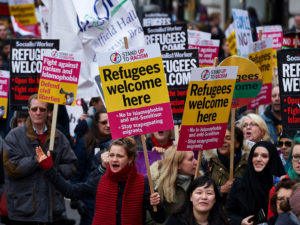Aussies among the most welcoming to refugees, says report
More than seven in ten Australians would welcome refugees into their cities, according a global survey by Amnesty International.
Australia ranked as the fifth most welcoming country to refugees, the survey found.

Demonstrators hold banners in support of refugees as they march through central London on March 19, 2016. (Photo credit NIKLAS HALLE’N – Getty Images)
China, Germany, Britain and Canada were ranked as the world’s most welcoming to refugees.
Russia, Indonesia and Thailand were considered the least welcoming.
The Refugees Welcome Index surveyed 27,000 people to measure public levels of acceptance of refugees in 27 countries.
The index ranked nations on a sliding scale of how willing citizens said they were to welcome refugees into their homes, neighbourhoods, cities, towns or villages and countries.
It found that 71 per cent of Australians believed that the Federal Government should do more to help refugees fleeing war or persecution.
“Australia has a long history of welcoming refugees and the overwhelming approval of the decision to accept 12,000 Syrian refugees is testament to that,” Amnesty International refugee coordinator Doctor Graham Thom said.
Eighty-four per cent of Australians believed that people fleeing war or persecution should be allowed to seek asylum in another country, the survey found.
The average figure globally was 73 per cent.
Across the globe, the findings reported that one person in ten would be prepared to take refugees into their homes. In Australia the figure was 13 per cent.
“These figures speak for themselves,” said Salil Shetty, Amnesty International’s secretary general.
“We did not expect to see such strong levels of solidarity with refugees, but the results reflect the inspiring human compassion people feel to those fleeing war. They want to do what they can to help, not turn their backs. Politicians need to show the same spirit.”
Mr Shetty said there was a “general feeling that the West has not delivered” in helping refugees.
Millions of people are displaced around the world each year by conflict and disaster.
The five-year long conflict in Syria, which has claimed around 270,000 lives, has sparked a major refugee crisis in the Middle East and Europe as people flee the fighting.
The report has been released in the lead up to next week’s World Humanitarian Summit.
Amnesty International is using the findings to call on the Australian government, as well as governments all around the world, to cease abusive deterrent methods in place of beneficial long-term solutions.
One in ten people around the world said they welcome a refugee to live in their own home, with the figure rising to 46 per cent in China and 29 per cent in the UK.
In Germany, a country that received 1.1 million asylum seekers in 2015, almost every respondent (96 per cent) said they would accept refugees in their country, while only 3 per cent said refugees should be refused entry. And 76 per cent of German respondents said their government should be doing more to assist refugees.
The overwhelming majority – 86 per cent – of the world’s refugees do not live in industrialised nations, but are hosted in developing countries, usually close to the one they fled. In those countries, attitudes to asylum seekers are overwhelmingly positive, according to the Amnesty research.
In Jordan, a country that already hosts 650,000 Syrian refugees, 84 per cent of people believe their government should do more to assist refugees fleeing war or persecution.
A quarter of Lebanon’s population are refugees and 69 per cent of that country’s citizens believe their government should do more to assist.
National leaders and delegates will meet at the UN-convened World Humanitarian Summit in Istanbul next week, where countries are expected to make commitments to resettle more refugees, particularly those displaced by ongoing conflict in the Middle East.
Jess Phillips
AMES Australia Staff Writer












